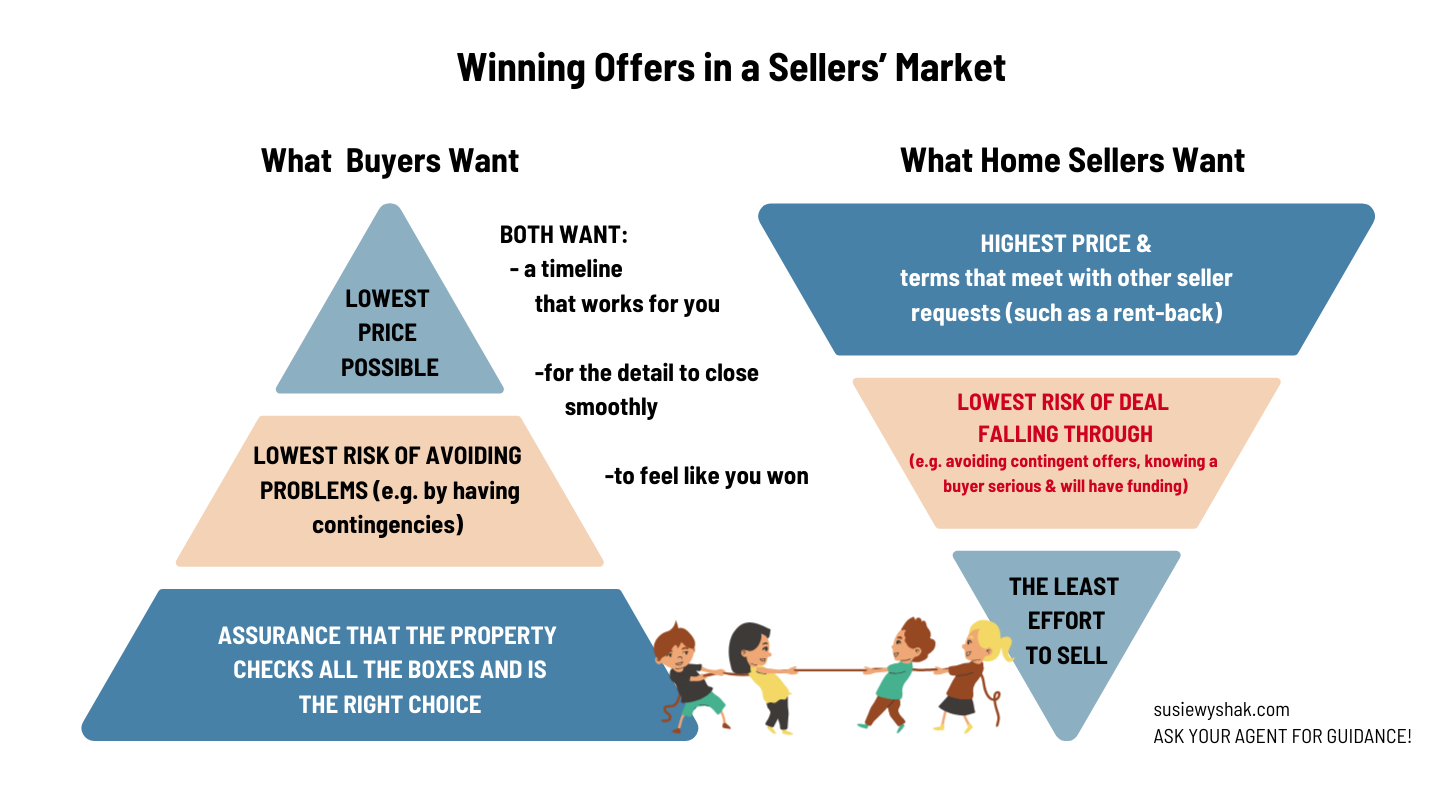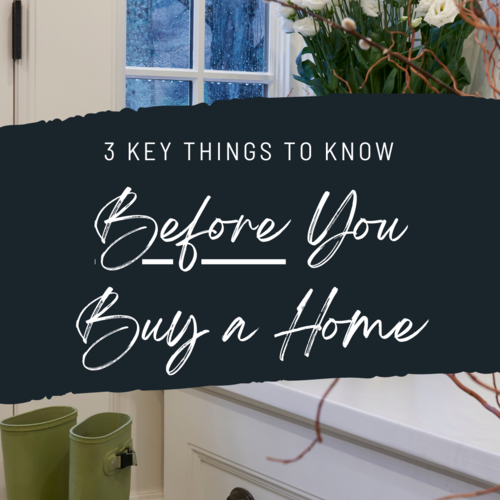How can a home buyer make a winning offer on a house that has multiple offers for which the seller is looking for the “highest and best” offer?
Good question! All along the East Bay near the Bay, Alameda, Albany, Berkeley, home sellers are countering multiple offers asking for “highest and best.”
In short, it’s like an auction. Only you usually don’t know what the other “bidders” are offering.
Your highest and best is your “walk away price.” If they don’t accept that price, you will happily walk away knowing you offered your best!
Keys to a Winning Offer
In a competitive real estate market with many buyers vying for the same properties, it’s crucial to craft a compelling and attractive home offer to increase your chances of success.
The graphic above illustrates what motivates most sellers along with what is probably motivating you, the buyer.
Here are the key components of a successful real estate home offer in such a competitive market in California:
- Under-written Pre-Approval Letter: Get pre-approved for a mortgage before you start your home search. A pre-approval letter from a reputable lender demonstrates to sellers that you are a serious and qualified buyer. A lender should be willing to immediately call the listing agent and vouch for you as an excellent home buying candidate, from a financial perspective. However know that cash is often king, if offer prices are similar. Why? The seller won’t have risk of a loan not getting funded.
- Appealing Price: Your offer should be competitive in terms of price. Have your agent research recent sales of similar properties in the area to determine the market value. Offering at or slightly above market value can make your offer more appealing. The more offers the listing agent expects to receive, the greater the chance you need to offer much over asking. Appraisal tip: If you’re getting a loan, it is important to consider what will happen if the house does not appraise for the amount you offered. One way to assure the seller you really want the house and want the deal to close is to include in the offer that you will fund $x amount if the house doesn’t appraise. For example, on a $1 million offer you could say you will pay up to $25K as an appraisal gap. So, if the appraiser says it is worth $975K, you would make up for the $25K.
Consider including an escalation clause: An escalation clause allows you to increase your offer if competing bids come in higher. It says that you’re willing to pay a certain amount above any higher competing offers, up to a predetermined maximum.
- Large Earnest Money Deposit: An earnest money deposit larger than the typical 3% can show your commitment to the purchase. For example 5%. A larger deposit can reassure the seller that you won’t back out of the deal….IF you don’t have contingencies. If you do have investigation, loan and appraisal contingencies, you can usually get your deposit back if there are issues, in most cases.
- Flexible Closing Date: Be flexible with the closing date to accommodate the seller’s needs. If they need a quick sale or extra time to move, aligning your closing timeline with the seller can make your offer more attractive.There is an agreement called Seller in Possession (SIP) that is a license for a seller to remain on the property for up to 29 days after escrow without becoming a “tenant.” This is handy if a seller has been living at the property during escrow and needs time to move out. Or, perhaps they had an offer on another property that was contingent on the sale of the property you are buying. So they may need for that to close, after which they will move out.
Several of my clients had their offers accepted by granting the SIP. They even became friends with the sellers!
- Contingency Waivers: While it is never advisable to waive contingencies in your offer, doing so reduces uncertainty for the seller. The listing agent may advise their client to consider offers with fewer contingencies. However, be cautious when waiving contingencies, especially the appraisal and inspection contingencies, as it involves major risk if you are offering well above what comparable houses have sold for and if there are no inspection reports provided, or the reports have minimal information or come from companies that aren’t local to the area.
- Inspection Flexibility: While it’s generally not advisable to skip a home inspection entirely, you can offer to limit the scope of requested repairs or accept the property “as-is” with the understanding that you’ll handle any major issues post-closing. For example, you may say if the inspections come up with less than $5000 in repairs you will waive the contingency early. In the East Bay there are the “usual suspects” of inspection companies and contractors who often inspect houses for sale and understand the nature of older houses in the area.
- “Love Letter:” Consider writing a letter to the seller without including any demographic or personal information that could be a Fair Housing violation.. Express your love for the home, your intentions for its use, and any personal connections you have to the property or neighborhood. Your agent should first check if sellers will review such letters. If not, your real estate agent should connect with the listing agent to let them know why you love the house so much and what a well-qualified, serious buyer you are.
- All-Cash Offer: If you have the financial means, an all-cash offer is very attractive to sellers because it eliminates the risk of a mortgage falling through. If you can’t make an all-cash offer, provide proof of funds to demonstrate your financial capacity. Get in touch to learn about ways to make an all-cash offer even if you don’t currently have a lot of cash on hand.
Prioritize the Buying Process & Respond Quickly!
Be prepared to respond promptly to counteroffers or requests for additional information. Quick communication signals your seriousness as a buyer. You may be busy at work but remember that your home purchase will likely be your largest financial decision. Set aside time to focus on it, for your own success!
Takeaway: Both buyers and sellers want to minimize their risk and maximize their gain.
Every market and situation is unique, even within a region, so we will work close together to tailor your offer to the specific circumstances.
As you can see, while price is a crucial factor, the terms and conditions of your offer can also make a significant difference with a home offer when you are going up against several other offers. Questions or comments? I’d love to hear.


